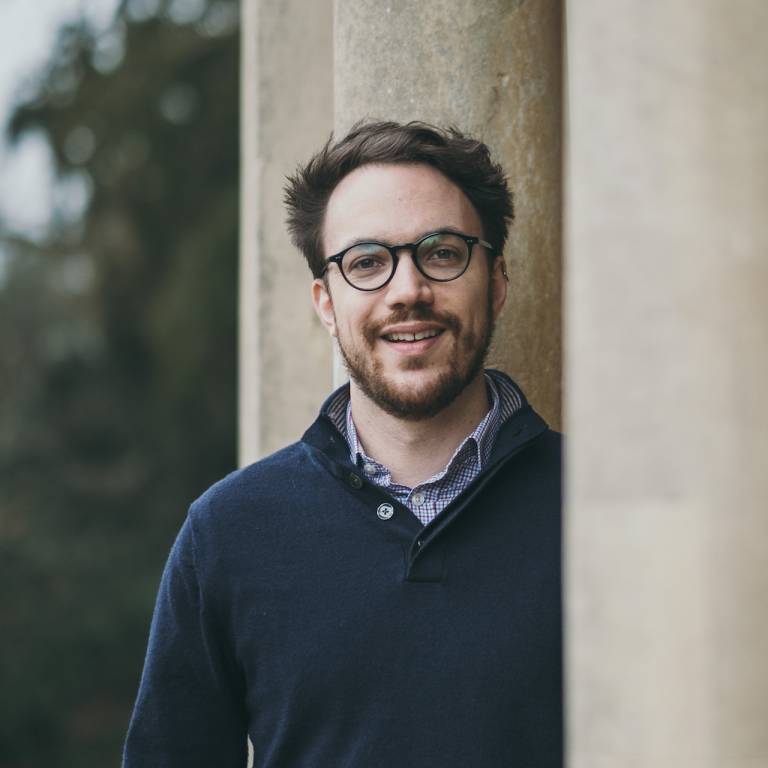Spotlight on Nick Witham
26 September 2019
Dr Nick Witham is an Associate Professor of United States History at the UCL Institute of the Americas.

What is the focus of your research?
I am a historian of the twentieth-century United States. My research interests span post-1945 political and intellectual history in transnational perspective, encompassing the histories of protest, imperialism and anti-imperialism, historiography, and memory.
What appealed to you about working for the Institute of the Americas?
Before I arrived at the Institute as a Lecturer in 2015, I had been lucky enough to hold a visiting fellowship in the 2013-14 year, co-sponsored by UCL and the British Association for American Studies. It quickly became apparent that the Institute is a unique venue in which researchers and students are encouraged to think and collaborate across disciplinary and geographical boundaries in order to further their knowledge of the Americas. I was really excited to get involved in that culture on a permanent basis. I also wanted to join one of the largest groups of U.S. historians in U.K. higher education: these colleagues, who span the Institute and the Department of History, are a source of constant inspiration to me.
Tell us about a project you are working on now.
I’m currently on research leave trying to finish my second book, which is provisionally titled The Popular Historians: U.S. Historical Writing and the Search for an Audience, 1945-present. It examines popular history books written by American historians as a means of engaging with non-academic audiences. Usually, when historians write histories of their discipline, they focus on other historians and what they said to each other. Instead, I am more interested in the relationships that historians developed with their publishers and readers as they sought to shape popular understandings of the nation’s past. The book focuses on five historians: Richard Hofstadter, Daniel Boorstin, John Hope Franklin, Howard Zinn, and Gerda Lerner, who wrote books between the 1940s and 1990s that were published by trade presses like Knopf, Random House and Harper & Row and sold millions of copies. I want to tell the story of how they came to write such books, who they thought their readers would be, and how the books changed their readers’ ideas about American history.
What do you find most interesting/enjoyable about your work?
We are very lucky to have such an inspiring group of students at the Institute. Every week during the teaching terms, I get to have invigorating conversations with bright, energetic people about the subjects in history that I am most interested in. Whether I’m lecturing on a first-year survey course, leading seminars with final-year undergraduates, or supervising MA and PhD dissertations, this is a thrilling – if sometimes exhausting! – experience.
What working achievement or initiative are you most proud of?
Between 2015 and 2018, I led the team that established the BA History and Politics of the Americas programmes at the Institute. They are the department’s first venture into full-scale undergraduate teaching, and there was a lot of complexity to navigate. But the payoff is immense: seeing upwards of 25 students arrive in September 2018, and almost 40 in September 2019, from all over the world and with a wide variety of experiences and interests, shows that the effort was definitely worth making.
What are your top tips for the new students who joined us in September?
If you are primarily interested in History or Politics, or in the United States, the Caribbean, or Latin America, this will be an important entry point into our degree. But you should also remember that studying the other discipline and other regions will hugely increase your overall knowledge and understanding. It will also give you a wider-ranging set of transferable skills to take into the job market.
Another tip: read, think, debate! As well as the academic reading you’ll be doing for classes, there are many websites and blogs out there that will help you to better understand the History and Politics of the Americas. From mainstream daily newspapers like the New York Times to alternative online publications like NACLA, you should aim to draw on as wide a range of information as possible, to help you understand the region and its political and historical development.
Can you tell us about your plans for the future?
It’s hard to see beyond the effort to finish my book, which is due with my publisher, Chicago University Press, at the end of 2020! But after that, I have two broad projects I will start working on. The first is a history of U.S. intellectuals and their relationship with anti-war movements from the War of 1898 to the War on Terror. The second is an intellectual history of wine in the United States since Prohibition. I’m also very much looking forward to getting back to teaching: I have a new module on “The United States and the Cold War” aimed at Year 2 students, and will also be involved in teaching the brand new Year 3 core module “Contemporary Issues in the Americas,” which gets students to think about how they can make the knowledge they have developed as part of their degree accessible to non-academic audiences via journalism, policy reports, data visualization and podcasting.
 Close
Close

